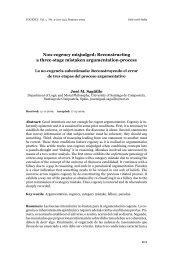Cogency v2 n2
Cogency v2 n2
Cogency v2 n2
You also want an ePaper? Increase the reach of your titles
YUMPU automatically turns print PDFs into web optimized ePapers that Google loves.
COGENCY Vol. 2, N0. 2, Spring 2010<br />
Deep disagreements, then, are not inter-framework disagreements occurring<br />
within a framework, language game or form of life, but rather are<br />
defined as intra-framework disagreements occurring across different frameworks,<br />
language games or forms of life.<br />
So far, it might seem as though deep disagreements are wide as well,<br />
involving whole systems of claims. Yet Fogelin’s examples (the abortion<br />
debate and the issue of affirmative action quotas) indicate that the depth of<br />
a disagreement may not be due to its breadth. Davson-Galle (1992: 153)<br />
concluded that deep disagreements might be isolated to a single claim (an<br />
ultimate premise, methodological principle or primitive rule of inference),<br />
just so long as that claim is genuinely basic or primary. 1 Similarly, Adams<br />
(2005: 69) gave an example of a seemingly narrow but deep disagreement,<br />
claiming that so long as “there exists no decision-procedure or other method<br />
for resolving [an] inconsistency [of opinions or judgments], the disagreement<br />
between the two disputants is deep.” 2<br />
On Fogelin’s picture, background or framework commitments provide<br />
the fixed context in which argument can occur, and in which differences of<br />
opinion can be articulated and settled. As such, Fogelin treats them as argumentatively<br />
basic, or primitive – while they guide the activity of reasongiving,<br />
they are not subject to it. Instead, Fogelin claimed that “the significance<br />
of all of our argumentative devices is internal to normal (or near normal)<br />
argumentative contexts” (p. 4).<br />
Since the marshaling of reasons is an inter-framework procedure, this<br />
means of resolution is unavailable in the situation of deep disagreement. As<br />
a consequence, “to the extent that the argumentative context becomes less<br />
normal, argument, to that extent, becomes impossible,” and genuinely deep<br />
(intra-framework) disagreements are “by their nature, not subject to rational<br />
resolution” (Fogelin, 1985: 4-7).<br />
1<br />
Such a basic difference might clearly have repercussions across the system(s), but any<br />
other differences would be traceable to this single difference, and shallow in relation to it. In<br />
this way, each party might agree that, were the difference on this one point settled, their<br />
other differences would also be settled as a consequence.<br />
2<br />
Davson-Galle (p. 153) observes that the existence of a shared decision procedure does<br />
not, in and of itself, provide sufficient resources for the resolution of disagreements – so<br />
long as the decision procedure itself is not decisive or can be properly applied in several<br />
incompatible ways.<br />
44








